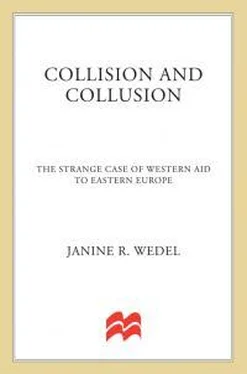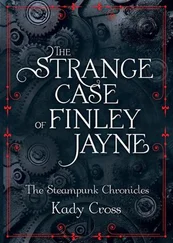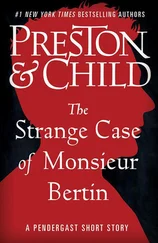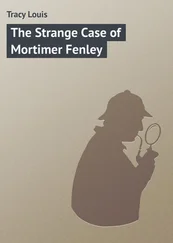Sachs and his associates built on methods the Harvard Institute had perfected to secure USAID funding for the Institute’s operations in Russia: the backing of their Harvard colleagues now in official Washington and the claim that the Institute’s work in the former Soviet Union was essential to U.S. national security. The Harvard coterie was helped by billionaire financier George Soros and his grantee Anders Åslund, the Swede.
Sachs co-authored Harvard’s proposal to provide macro- and micro-economic advice to Ukraine with Åslund. As in Russia, the Harvard Institute (this time composed of a different group of players) lobbied for, and was awarded, a contract to offer macroeconomic advice and to work with high officials, notably Minister of Economics Roman Shpek. The Harvard Institute’s proposal was unusual in a number of respects, beginning with its point of origin, which was not USAID. In answer to the question “Where did the HIID-Ukraine project originate?” Laurier Mailloux, director of USAID’s Office of Privatization and Economic Restructuring, reported that it “did not originate here.” And who made the decision to fund the HIID-Ukraine project? “That was a political decision that we [my office] weren’t involved in.… there were a number of other actors.”214
Indeed, the unsolicited Sachs-Åslund proposal did not prove to be an easy sell. The prospect of the Harvard Institute working in Ukraine met with resistance from USAID officials both in Washington and Kiev, as well as from the IMF and Ukrainian officials, including some in the National Bank of Ukraine, Ukraine’s central bank. All opposed Harvard’s project as redundant. The project “has not been without controversy”—the need for it was questioned by both the USAID mission in Kiev and by players within the Ukrainian government, including the National Bank, according to then-deputy aid coordinator William B. Taylor.215 Further, a letter to USAID from the government of Ukraine stated that Ukraine did not need more macroeconomic advisers. USAID’s Dine acknowledges that “they [the IMF] thought it would be duplicating their work.”216
Sachs responded by launching a lobbying effort. He contacted members of the U.S. Congress and made trips to Washington to meet with State Department and USAID officials. Some of his associates in government helped set up a high-level interagency “Steering Committee” that favored Harvard and promoted the Harvard-Ukraine award, according to USAID’s Thomas Dine. Stanley R. Nevin, the USAID procurement officer who signed the Harvard award, said that the Department of the Treasury was especially “involved” in the Harvard-Ukraine project.217 A key player in the Treasury Department, David Lipton, Sachs’s former business associate and co-author, and by then assistant secretary of the Treasury for Eastern Europe and the former Soviet Union, represented Treasury on the Steering Committee. Other members of the committee were Harvard graduate Richard Morningstar, head of the U.S. Department of State’s Coordinator’s Office, National Security Council official and Harvard graduate Carlos Pascual, and Thomas Dine and Donald Pressley from USAID. As of this writing, Pascual is the U.S. Ambassador-designate to Ukraine.
Members of the Steering Committee met a number of times with Soros and Åslund, according to committee participants. Soros hosted at least one meeting attended by Lipton, other committee members, and Sachs. And Åslund was a frequent visitor at Treasury, where he met with Lipton and his boss, Deputy Secretary Summers, Sachs’s colleague from Harvard.218 As a result of this collaboration, the considerable objections to the Harvard Institute’s work in Ukraine were overruled by the U.S. executive branch. Representatives of the Steering Committee (or their deputies) signed the “foreign policy” exemptions that directed USAID to bypass the usual competition and enabled the Harvard Institute to secure funding for its Ukraine operations, albeit at a lower level than originally sought.219
Although the GAO investigated the Harvard Institute’s Russian and Ukrainian projects in 1996, its findings were largely suppressed by the agency’s timid management. The audit team concluded, for example, that the U.S. government exercised “favoritism” toward Harvard, but this conclusion and the supporting documentation were removed from the final report.220
POLICIES FOR A POSITIVE IMPACT
Like Central and Eastern Europeans, Russians and Ukrainians expected Western help after the fall of the Soviet Union. In Russia, reactions to Western aid had the special flavor of a superpower gone down: Many Russians experienced the loss of superpower status as a loss of identity. As one Russian analyst put it: “We are no longer one-sixth of the earth’s surface.… But we continue to carry within ourselves one-sixth of the globe.… It is a scale we have become accustomed to.”221 But Western aid resonated somewhat differently in Ukraine than it had in Russia. In contrast to Russia’s “power culture”222 sense of innate superiority, Ukraine evinced something of an inferiority complex. Ukraine was not a down-and-out superpower; it was a nation deeply frustrated by its economic and political isolation. Despite these differences, assistance met with the same phases of Triumphalism followed by Disillusionment as elsewhere in Central and Eastern Europe.
What was the alternative to supporting “reformers,” charged as they were with responsibility for economic reform for the nation? And what could be wrong with creating private organizations to bypass inefficient government? The fallacy lay in thinking that lasting institutions can be built by supporting particular people, instead of helping to facilitate processes and the rule of law. A system based primarily on personal connections and handshakes did not foster the development of independent institutions that could outlive their current executives. Crucially, by singling out one group of “reformers,” the United States discouraged many reforms—and encouraged anti-Western, anti-reform elements, who could point with glee to the absence of real benefits to Russia. Indeed, far from fulfilling their promise of a better life, the U.S.-sponsored “reforms” of the 1990s left many, if not most, Russians worse off.223 And by promoting the media-savvy, polished, English-speaking Chubais Clan, and excluding other, less Westernized groups shaping Russian politics and economics, the U.S. aid establishment offended many Russians and fueled anti-Western sentiment. Many Russians today blame precisely the Western aid and advice they have received. E. Wayne Merry, a former senior political officer with the U.S. Embassy in Moscow, explains this in terms of the Russian weariness for “reform” experiments:
I remember, in the early ’90s, I think the most poignant slogan that you saw in Russia during the demonstrations was “no more experiments.” The people were terribly tired of being treated like laboratory rats. This effort to build the new socialist man, scientific socialism had left people feeling completely alienated from their authorities. And the one thing the Russian people wanted was not to be treated like experimental material.
And unfortunately, what they got in the 1990s was another series of experiments, where many of the scientists conducting the experiments were not even Russians, but were people sitting in offices in Washington, in the U.S. Treasury and the IMF. And I think much of the disillusion with the West, much of the hostility that Russians now feel, particularly towards the United States, is reaction to what they feel was another series of failed experiments.224
Thomas E. Graham, also formally of the U.S. Embassy in Moscow, sees a connection in the “growing anti-Western, anti-Americanism” in Russia and Western advice: “Political elites began to question the type of advice that the West was passing on. Many of them drew the conclusion that the West had achieved what it wanted, which was the weakening of the Russian state.”225 How Russian elites perceived the efficacy of Western aid programs and the motives of donors should have been a source of concern to donors, especially because many Russians already questioned U.S. motivations. According to one public-opinion survey carried out in the spring of 1995, two-thirds of the Russian people believed that the United States had a calculated anti-Russian foreign policy.226 Opinion polls conducted by the Department of State’s Office of Research have tracked a downslope in favorable opinion of the United States from more than 74 percent in 1993 to 65 percent in 1994 to 54 percent in 1999 and 48 percent in mid-2000.227 In one poll, 41.1 percent of the respondents said that Western countries wanted Russia to be a “Third World” state, 37.5 percent supposed that their goal was to destroy Russia as an independent state, and only 3.7 percent felt that the West was trying to help.228
Читать дальше












